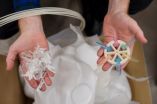(Press-News.org) Making your own stuff with a 3D printer is vastly cheaper than what you'd pay for manufactured goods, even factoring in the cost of buying the plastic filament.
Yet, you can drive the cost down even more by making your own filament from old milk jugs. And, while you are patting yourself on the back for saving 99 cents on the dollar, there's a bonus: you can feel warm and fuzzy about preserving the environment.
A study led by Joshua Pearce of Michigan Technological University has shown that making your own plastic 3D printer filament from milk jugs uses less energy—often a lot less—than recycling milk jugs conventionally.
Pearce's team did a life-cycle analysis on a run-of-the-mill milk jug made from HDPE plastic. After cleaning it and cutting it in pieces, they ran it through an office shredder and a RecycleBot, which turns waste plastic into 3D printer filament.
Compared to an ideal urban recycling program, which collects and processes plastic locally, turning milk jugs into filament at home uses about 3 percent less energy. "Where it really shows substantial savings is in smaller towns, where you have to transport the plastic to be collected, then again to be recycled, and a third time to be made into products," said Pearce, an associate professor of materials science and engineering/electrical and computer engineering. Then the energy savings skyrocket to 70-80 percent. And, recycling your own milk jugs uses 90 percent less energy than making virgin plastic from petroleum.
Pearce also compared the cost of making your own filament with buying it.
"Filament is retailing for between $36 and $50 a kilogram, and you can produce your own filament for 10 cents a kilogram if you use recycled plastic," he said. "There's a clear incentive, even if you factor in the cost of buying the RecycleBot."
Commercial variants like the Filastruder cost under $300.
HDPE plastic isn't ideal. "It shrinks slightly as it cools, so you have to take that into account," said Pearce. "But if you are making something like a statue or a pencil holder, it doesn't matter."
This new recycling technology has caught the eye of the Ethical Filament Foundation, which aims to improve the lives of waste pickers, who scour other people's trash for items to sell or recycle. "In the developing world, it's hard to get filament, and if these recyclers could make it and sell it for, say, $15 a kilogram, they'd make enough money to pull themselves out of poverty while doing the world a lot of good," he said.
INFORMATION:
The study, " Life-Cycle Analysis of Distributed Recycling of Post-consumer High Density Polyethylene for 3-D Printing Filament," by Megan Kreiger, Meredith Mulder, Alexandra Glover and Pearce, all of Michigan Tech, was published Feb. 12 in the Journal of Cleaner Production, http://dx.doi.org/10.1016/j.jclepro.2014.02.009 . An open access version is available from Academia.edu, https://www.academia.edu/6188555/Life_cycle_analysis_of_distributed_recycling_of_post-consumer_high_density_polyethylene_for_3-D_printing_filament
Save money and the planet: Turn your old milk jugs into 3D printer filament
Study confirms energy and cost savings over standard recycling
2014-03-05
ELSE PRESS RELEASES FROM THIS DATE:
Seeking quantum-ness: D-Wave chip passes rigorous tests
2014-03-05
With cutting-edge technology, sometimes the first step scientists face is just making sure it actually works as intended.
The USC Viterbi School of Engineering is home to the USC-Lockheed Martin Quantum Computing Center (QCC), a super-cooled, magnetically shielded facility specially built to house the first commercially available quantum computing processors – devices so advanced that there are only two in use outside the Canadian lab where they were built: The first one went to USC and Lockheed Martin, and the second to NASA and Google.
Since USC's facility opened ...
Calcium and vitamin D improve cholesterol in postmenopausal women
2014-03-05
CLEVELAND, Ohio (March 5, 2014)—Calcium and vitamin D supplements after menopause can improve women's cholesterol profiles. And much of that effect is tied to raising vitamin D levels, finds a new study from the Women's Health Initiative (WHI) just published online in Menopause, the journal of The North American Menopause Society (NAMS).
Whether calcium or vitamin D can indeed improve cholesterol levels has been debated. And studies of women taking the combination could not separate the effects of calcium from those of vitamin D on cholesterol. But this study, led by NAMS ...
Blocking immune system protein in mice prevents fetal brain injury, but not preterm birth
2014-03-05
An inflammatory protein that triggers a pregnant mouse's immune response to an infection or other disease appears to cause brain injury in her fetus, but not the premature birth that was long believed to be linked with such neurologic damage in both rodents and humans, new Johns Hopkins-led research suggests.
The researchers, reporting online March 5 in the American Journal of Reproductive Immunology, also say they found that an anti-inflammatory drug that is FDA-approved for rheumatoid arthritis and is believed to be safe for humans to take during pregnancy halted the ...
New program for students with autism offers hope after high school
2014-03-05
An innovative program from UNC's Frank Porter Graham Child Development Institute (FPG) and 6 partner universities is preparing students with autism for life after high school.
"Public high schools may be one of the last best hopes for adolescents with autism—and for their families," said FPG director Samuel L. Odom. "Many of these students will face unemployment and few social ties after school ends."
According to Odom, teachers and other professionals in the schools work hard to achieve beneficial results for students with autism spectrum disorders (ASD). But positive ...
Darwin: It's not all sexual (selection)
2014-03-05
Since the days of Darwin, scientists have considered bird song to be an exclusively male trait, resulting from sexual selection. Now a team of researchers from the University of Maryland, Baltimore County (UMBC), the University of Melbourne in Australia, Leiden University in the Netherlands and The Australian National University says that's not the whole story.
The team used information from several sources, including the Handbook of the Birds of the World. Their survey included birds from all over the globe, but focused on early-diverging Australasian lineages, which ...
Playing with Barbie dolls could limit girls' career choices, study shows
2014-03-05
CORVALLIS, Ore. – In one of the first experiments to explore the influence of fashion dolls, an Oregon State University researcher has found that girls who play with Barbie dolls see fewer career options for themselves than for boys.
"Playing with Barbie has an effect on girls' ideas about their place in the world," said Aurora M. Sherman, an associate professor in the School of Psychological Science at OSU. "It creates a limit on the sense of what's possible for their future. While it's not a massive effect, it is a measurable and statistically significant effect."
Findings ...
First step towards 'programmable materials'
2014-03-05
Although the "programmable material" still only works in a one-dimensional model construction, it has already demonstrated it unusual capabilities: The research project entitled Phononic Crystal with Adaptive Connectivity has just been published in the journal Advanced Materials. The first step towards mechanical components with freely programmable properties has thus been achieved.
The working model used by the researchers consists of a one-meter by one-centimeter aluminum plate that is one millimeter thick. This sheet-metal strip can vibrate at different frequencies. ...
Research shows patient satisfaction can be high, even in emergency care situations
2014-03-05
MINNEAPOLIS, MN – March 4, 2013 – The Minneapolis Heart Institute Foundation (MHIF) today announced the results of survey research aimed at discovering patient and family satisfaction with acute care transfers for patients with STEMI (ST-segment elevation myocardial infarction), a severe heart attack best treated quickly with specialized care. The results, based on 98 patient and 80 family surveys, suggest that patient satisfaction with care decisions and communication can be high, even in emergency care situations that require rapid and complex decision making and, in ...
Researchers identify key enzyme found in bacteria responsible for heart valve disease
2014-03-05
A disease-causing bacterium found in the mouth needs manganese, a trace mineral, in order to cause a serious heart infection, according to a preclinical study led by researchers at Virginia Commonwealth University Philips Institute for Oral Health Research in the School of Dentistry.
The findings, which may solve a longstanding mystery of why some bacteria need manganese to cause disease, provide possible new targets for antibiotics.
Researchers from VCU and MIT have been studying the bacterium Streptococcus sanguinis, which lives in the mouth, to understand its role ...
New shrinking gel steers tooth tissue formation
2014-03-05
VIDEO:
When the temperature rises to just below body temperature, this biocompatible gel shrinks dramatically within minutes, compressing tooth-precursor cells (green) enclosed within it.
Click here for more information.
BOSTON, March 5, 2014 — A bit of pressure from a new shrinking, sponge-like gel is all it takes to turn transplanted unspecialized cells into cells that lay down minerals and begin to form teeth.
The bioinspired gel material could one day help repair or replace ...
LAST 30 PRESS RELEASES:
Chimps’ love for crystals could help us understand our own ancestors’ fascination with these stones
Vaginal estrogen therapy not linked to cancer recurrence in survivors of endometrial cancer
How estrogen helps protect women from high blood pressure
Breaking the efficiency barrier: Researchers propose multi-stage solar system to harness the full spectrum
A new name, a new beginning: Building a green energy future together
From algorithms to atoms: How artificial intelligence is accelerating the discovery of next-generation energy materials
Loneliness linked to fear of embarrassment: teen research
New MOH–NUS Fellowship launched to strengthen everyday ethics in Singapore’s healthcare sector
Sungkyunkwan University researchers develop next-generation transparent electrode without rare metal indium
What's going on inside quantum computers?: New method simplifies process tomography
This ancient plant-eater had a twisted jaw and sideways-facing teeth
Jackdaw chicks listen to adults to learn about predators
Toxic algal bloom has taken a heavy toll on mental health
Beyond silicon: SKKU team presents Indium Selenide roadmap for ultra-low-power AI and quantum computing
Sugar comforts newborn babies during painful procedures
Pollen exposure linked to poorer exam results taken at the end of secondary school
7 hours 18 mins may be optimal sleep length for avoiding type 2 diabetes precursor
Around 6 deaths a year linked to clubbing in the UK
Children’s development set back years by Covid lockdowns, study reveals
Four decades of data give unique insight into the Sun’s inner life
Urban trees can absorb more CO₂ than cars emit during summer
Fund for Science and Technology awards $15 million to Scripps Oceanography
New NIH grant advances Lupus protein research
New farm-scale biochar system could cut agricultural emissions by 75 percent while removing carbon from the atmosphere
From herbal waste to high performance clean water material: Turning traditional medicine residues into powerful biochar
New sulfur-iron biochar shows powerful ability to lock up arsenic and cadmium in contaminated soils
AI-driven chart review accurately identifies potential rare disease trial participants in new study
Paleontologist Stephen Chester and colleagues reveal new clues about early primate evolution
UF research finds a gentler way to treat aggressive gum disease
Strong alcohol policy could reduce cancer in Canada
[Press-News.org] Save money and the planet: Turn your old milk jugs into 3D printer filamentStudy confirms energy and cost savings over standard recycling





